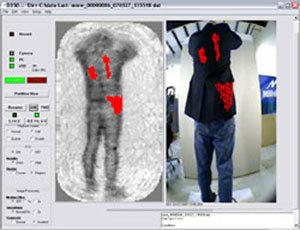Aviation securityMore travelers worry about health effects of airport scanning
More than 1 in 5 passengers in a recent survey (23 percent) said they would refuse to be examined in one of the whole-body scanners now in many airports; a third of people under 35 said they would decline the scans; the debate among health and radiation experts continue, with no consensus yet about the health effects of airport screening

Concerns grow over health effects of scanner use // Source: technewsdaily.com
The introduction of full-body scanners at more and more U.S. airports has raised still-to-be-answered health questions in the minds of travelers. NPR-Thompson Reuters Health Poll recently asked Americans a few questions about air travel and health, and the latest NPR-Thomson Reuters Health Poll finds that when it comes to flying, the vast majority of American do not have a care about health once they are in the air. Only 8 percent said they had any health worries about traveling by plane; 92 percent do not think twice.
An NPR release reports that the biggest personal risks from being airborne, according to travelers, are these: 21 percent cited the ultimate health risk: a crash. Sixteen percent said it was catching a cold or the flu. About 7 percent said it was anxiety.
Only 5 percent said developing a blood clot, which has been recognized as a problem for sedentary travelers on long-haul flights.
Only 11 percent said they thought that air travel had made them ill at least once.
How about the security screening that goes on before the plane takes off? More than 1 in 5 respondents (23 percent) said they would refuse to be examined in one of the whole-body scanners now in many airports. A third of people under 35 said they would decline the scans.
About 23 percent of poll respondents said they were concerned about radiation exposure from the scans. Invasion of privacy bothered 17 percent, and 13 percent object to the scans because they consider them to be an unreasonable search.
The risk from radiation exposure from the security checks is scant, said Dr. Ray Fabius, chief medical officer for the health care unit of Thomson Reuters. “The much more serious health concerns associated with flying are exposure to communicable illnesses and blood clots during long air excursions,” he said. “By avoiding traveling when sick and exercising in your seat, these risks can be minimized.”
The release notes that the telephone poll of more than 3,000 adults across the United States was conducted during the first half of November. The margin for error is plus or minus 1.8 percentage points. Click here to read the questions and complete results. You can find the previous polls here.
